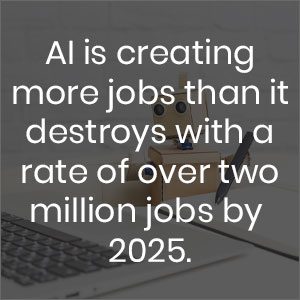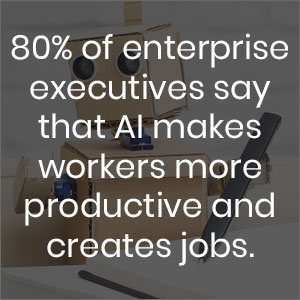With the emergence of new technologies and automation, invariably, the question is asked: “Will artificial intelligence replace my job?”
Naturally, with society evolving so rapidly, one cannot be blamed for thinking that the world is going to become dominated by robots. But research and evidence show that artificial intelligence (AI) will not take away your job; rather it will replace it with something far less painstaking, as they perform all of the labor-intensive tasks. What’s more, for every position that AI removes, more will be created in its place. After all, AI-driven automation is not about supplanting human labor altogether. Those who choose to work with it instead of against it will see firsthand all of its benefits.AI is creating more jobs than it destroys with a rate of over two million jobs by 2025.
Let’s look at the positive effects that artificial intelligence will have on various sectors – in many workplaces – and all of the evidence that the human brain is still very much needed in the workforce.
AI Will Create Jobs, Not Replace Them
For starters, artificial intelligence will actually lead to many more jobs than previously imagined. As a matter of fact, Gartner reports that AI creates more positions than it replaces, with close to two million jobs promised by 2025. This is because AI cannot function without a human taking the time to train it in the first place. It also needs to be monitored and maintained by people while it is in motion and doing its job. In other words, AI may take away certain tasks from humans but still needs our help for just about everything else. And if you are not looking to train an AI, rest assured: you can still do your everyday job but focus on the tasks that require more thinking and attention.
In essence, AI will shift jobs and change daily routines, thereby changing the future of work for the better.
PRODUCTIVITY IN THE WORKPLACE
Let’s face it, there is always that one thing that you hate doing at work. Maybe it’s editing a document, reviewing an outline, or performing tedious work requiring tons of your time and effort. But what if all of that work was completed for you in mere seconds? This is where artificial intelligence comes into play. It frees you up to work on projects that require far more of your focus.
80% of enterprise executives say that AI makes workers more productive and creates jobs. According to Forrester, businesses that combine AI with human insights witness nearly a 70 percent boost in productivity. And with AI speeding up the transaction process, they see more than a 60 percent increase in customer satisfaction, not to mention an improvement in their overall reputation. In fact, 80 percent of enterprise executives say that AI makes workers more productive, whether they’re in pre-existing positions or new ones created by AI, itself, according to Data Science U.S. It helps to move the business forward.
EMBRACE THE CHANGE 
The prospect of artificial intelligence replacing your job has always been feared. It may even be difficult to believe the statistics that say that it won’t, with all of the advances in technology and the rapid evolution of machines. But it’s more worthwhile to adapt tech like AI than push it away. It exists solely to work with you, not against you, and cannot function at all in the absence of human intelligence. In other words, without you, there is no AI.
Next in our series about artificial intelligence in the workforce is a discussion around another common question in legal: “Will AI replace judges and lawyers?”
For more proof that AI is, indeed, a good thing, check out ContractPodAi’s contract lifecycle management system (CLM). We use artificial intelligence by E: V to give you the best CLM software on the market. Request a demo or download our contract management primer to learn more about it today!
Author:

Sajel Mistry
Connect with us on Linkedin




